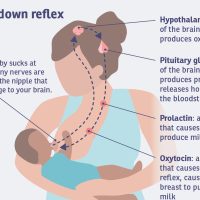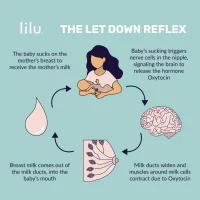Some ways to encourage teen moms to breastfeed:
To support teenage mothers in breastfeeding, consider framing it as a short-term experiment rather than a lifelong commitment. Encourage her to try breastfeeding for a few days or weeks, which could help her build confidence and continue even if she initially felt hesitant. Unless she explicitly asks, avoid discussing long-term plans to prevent overwhelming her. Instead, focus on creating a nonjudgmental space where she feels comfortable exploring this option.
Peer influence plays a critical role in teen decision-making. Connecting her with another young mother who has successfully breastfed can provide relatable guidance and normalize the experience. Teens often trust advice from those closer to their age more than from older adults, making peer mentorship a powerful tool.
Approach conversations with genuine enthusiasm. While excessive eagerness might seem insincere to older individuals, teens are often drawn to positivity and energy. Emphasize the immediate benefits, such as bonding with the baby or quicker postpartum recovery, rather than abstract future health advantages. Highlighting tangible, present-day rewards aligns better with their priorities and increases engagement.
Following are some benefits that are likely to interest a teen mom:
- Breastfeeding offers multiple advantages that may appeal to teenage mothers. For physical recovery, it supports gradual weight loss without calorie restriction and accelerates postpartum uterine contraction, helping the body return to its pre-pregnancy state more efficiently. Additionally, breastfeeding delays the return of menstruation, providing temporary relief from menstrual cycles.
- The convenience factor is another key benefit. It eliminates the need for bottle preparation and cleaning, streamlining daily routines. With practice, mothers can multitask—nursing while sleeping, eating, or even socializing. This flexibility simplifies outings, managing teething discomfort, and caring for a sick infant, reducing disruptions to school, work, or social commitments.
- Financially and environmentally, breastfeeding is cost-effective and sustainable. It avoids formula expenses and lowers healthcare costs due to fewer infant illnesses. Environmentally, it reduces waste from formula packaging and transportation.
- On a personal level, breastfeeding fosters maternal confidence and empowerment. Teen mothers often report stronger parenting self-assurance and a heightened sense of control over their lives—a crucial emotional anchor during adolescence. It also strengthens the mother-baby bond, addressing concerns about being overshadowed by grandmothers in caregiving roles.
Suggest inviting the mother to join a breastfeeding support group, such as La Leche League (LLL), alongside her closest friend. Positioning the friend as the baby’s honorary “aunt” or “guide” can foster a sense of shared responsibility and belonging. Many teen mothers experience social isolation as peers transition to college, careers, or struggle to relate to parenthood. Including a trusted friend in these meetings not only eases the mother’s anxiety but also strengthens the friend’s connection to the baby, increasing the likelihood of lasting support.
Prioritize intensive breastfeeding guidance during the hospital stay. Teen mothers often remain uncertain about nursing until delivery, making timely, compassionate education crucial for building confidence.
Address common misconceptions they may encounter:
- Myth: Breastfeeding is inherently painful.
- Myth: Nursing permanently alters breast appearance.
- Myth: Larger breasts are required for sufficient milk supply.
- Myth: Breastfeeding limits personal freedom or independence.
Proactively clarifying these concerns helps counter societal stereotypes and empowers informed decisions.
Young mothers frequently express heightened anxiety about nursing in public spaces, fearing judgment from peers or the baby’s father. Address these concerns by discussing discreet breastfeeding techniques—such as using lightweight covers or strategic positioning—to help her nurse confidently without drawing unwanted attention.
Research highlights the father’s support as a pivotal influence on a teen mother’s decision to breastfeed. Emphasize advantages that resonate with partners:
- Convenience: No bottle preparation, sterilization, or late-night formula runs.
- Cost savings: Eliminates formula expenses entirely.
- Ease of care: Breastfed babies’ diapers have milder odors compared to formula-fed infants.
Simplify education by prioritizing visual or interactive resources like videos or illustrated pamphlets, as dense text can feel intimidating.
For mothers balancing school or work postpartum, reassure them that breastfeeding adapts to their schedule. Even without pumping, they can nurse during shared moments and use formula supplementation when apart. This flexible approach reduces pressure while maintaining bonding opportunities.
Breastfeeding also serves as an empowering act for young mothers facing societal skepticism. It fosters physical closeness with their baby, countering narratives that undermine their parenting capabilities. Unlike bottle-feeding, which relatives might take over, breastfeeding reinforces the teen mother’s irreplaceable role in her child’s life.




